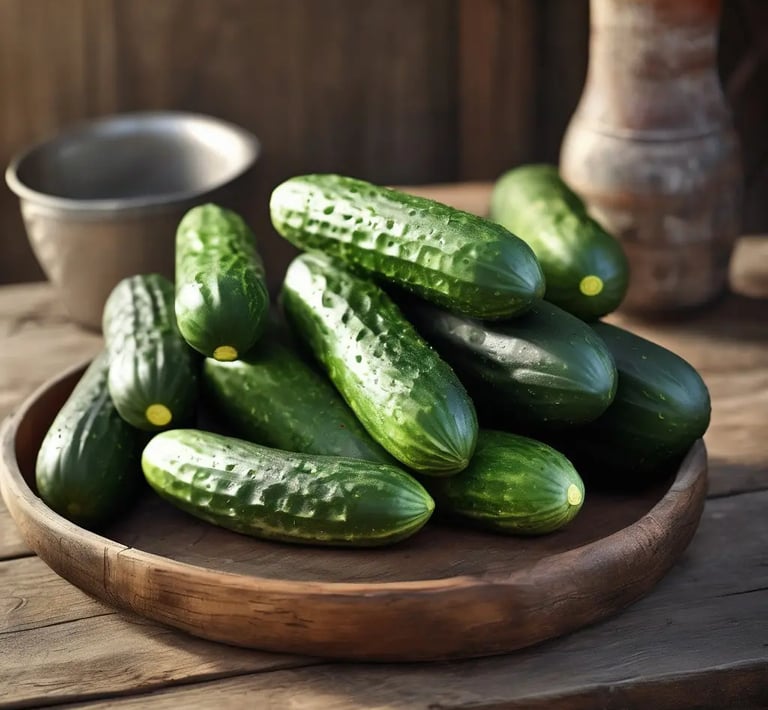Cucumber: More Than Just a Salad Ingredient
Discover the benefits of cucumber, its nutritional value, its various culinary uses, and its beauty secrets. A refreshing vegetable to rediscover!
VEGETABLES


1 – Cucumber: A Vegetable of Many Facets
Often relegated to the rank of a bland and not very nutritious ingredient, the cucumber deserves to be rediscovered. This refreshing vegetable, originally from India, is packed with health benefits and lends itself to multiple uses in cooking and beauty. Let's dive together into the unknown world of cucumbers.
In this article you will discover:
1 - Cucumber: a vegetable with many facets
2 - A vegetable full of water and benefits
3 - An ally for slimming and digestion
4 - Cucumber in all its forms: various uses
5 - Choosing and storing your cucumbers
6 - Conclusion
2 – A Vegetable Bursting with Water and Benefits
Composed of over 95% water, cucumber is an excellent choice for hydration, especially during hot weather. But its richness doesn't stop there.
A Concentrate of Vitamins and Minerals
Despite its low-calorie content, cucumber provides an interesting intake of vitamins and minerals essential for the proper functioning of the body:
Vitamin K: Essential for blood clotting and bone health.
Vitamin C: A powerful antioxidant, it helps protect cells against oxidative stress and contributes to collagen formation.
B Vitamins: Involved in many metabolic processes, including energy production and proper nervous system function.
Potassium: An essential mineral for muscle contraction, nerve transmission, and blood pressure regulation.
Manganese: A trace element involved in antioxidant protection, bone formation, and carbohydrate metabolism.
Antioxidant and Anti-Inflammatory Properties
Cucumber is also rich in antioxidants, compounds that protect cells against damage caused by free radicals, which are involved in premature aging and the development of certain chronic diseases.
Among these antioxidants are:
Cucurbitacin: Known for its anti-inflammatory and anti-cancer properties.
Beta-carotene: A precursor to vitamin A, it contributes to eye and skin health.
Lutein and zeaxanthin: Two carotenoids that protect the eyes from damage related to blue light and aging.
3 - A Slimming and Digestive Ally
With its low-calorie content (about 15 calories per 100g) and its richness in water and fiber, cucumber is an excellent ally for weight management and promoting digestion.
Appetite suppressant effect: Its richness in water and fiber provides a rapid and lasting feeling of fullness, thus limiting snacking between meals.
Stimulation of intestinal transit: The fibers contained in cucumber promote intestinal transit and prevent constipation.
Natural diuretic: Thanks to its high water and potassium content, cucumber has diuretic properties that help eliminate toxins and fight water retention.
4 - Cucumber in All Its Forms: Various Uses
While cucumber is often eaten raw in salads, it lends itself to many other culinary uses.
In the Kitchen:
Fresh and summer salads: Cucumber, tomatoes, feta, mint... The combinations are endless!
Cold soups: Gazpacho, Greek yogurt soup... Cucumber brings freshness and lightness.
Sandwiches and wraps: For a crunchy and hydrating touch.
Side dish: Grated, diced, or sliced, it goes perfectly with fish, white meats, and mixed salads.
Refreshing drinks: Cucumber and lemon-infused water, detox green smoothie...
In Beauty:
Hydrating and refreshing mask: Blend half a cucumber and apply the paste to your face for 15 minutes. Rinse with clear water.
Anti-dark circle treatment: Apply slices of fresh cucumber to your eyes for 10 minutes to reduce dark circles and puffiness.
Astringent toner: Soak a cotton pad in cucumber water (obtained by infusing cucumber slices in boiling water) and apply to your clean face to tighten pores and mattify the skin.
5 – Choosing and Storing Your Cucumbers
Choice: Choose firm, smooth cucumbers without blemishes. Opt for organic cucumbers to avoid pesticide residues.
Storage: Store your cucumbers in the refrigerator, in the vegetable crisper, for about a week.
6 – Conclusion
Cucumber, far from being a bland and uninteresting vegetable, is full of benefits for health, beauty, and cooking. Refreshing, hydrating, low in calories, and rich in nutrients, it deserves a prominent place in your diet and beauty routines. So go ahead and let yourself be seduced by this multifaceted vegetable!
If you liked this article. Don't hesitate to read the one about carrots: Click here
